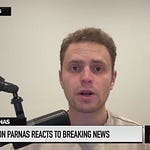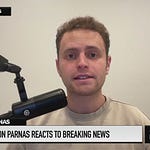Good morning! I’m kicking off this beautiful Sunday with our weekly good news update—our Sunday morning tradition.
But first, here’s a victory worth celebrating: Despite relentless attacks from the right, despite TikTok’s censorship over our Epstein reporting, this Substack remains the number one news Substack for four months in a row. That’s what happens when you refuse to sell out, refuse to bend to pressure from the current administration, and stay laser-focused on delivering the truth—no matter the cost.
And let me be crystal clear: if it ever comes down to a fight for our First Amendment rights, I will not flinch. I’ll stand my ground, I’ll bring in the best legal firepower, and I’ll push back with everything I’ve got. Caving is not an option. Fighting for the truth always is.
If you want to see this movement grow—if you want more voices, more coverage, and more truth—then subscribe today. Every single contribution directly fuels our mission, expands our team, and strengthens our reach. We’re just getting started.
With that, here’s the good news:
After Chicago man Angel Santiago’s senior service dog “Bam Bam” was stolen, the local community and online supporters rallied together, ultimately reuniting him with his beloved companion.
After seeing people eat from his dumpster, Minnesota pizzeria owner Chris Kolstad offered free food to anyone in need, sparking community support, raising thousands in donations, and helping nearly 100 people while also boosting local food shelf efforts.
A chance encounter in Miami turned into a heartwarming bond when 29-year-old Estrella Quiroz offered 97-year-old Lilian a ride and lunch at Wendy’s, sparking a viral friendship that inspired donations of over $21,000, a Wendy’s gift card, and widespread praise for the power of small acts of kindness.
A new STAT3-targeting cancer therapy for cats with head and neck cancers shows promise in extending feline survival with minimal side effects, and could also advance treatments for deadly human head and neck squamous cell carcinoma by providing a more effective model than mouse trials.
University of Minnesota researchers developed a 3D-printed “organoid scaffold” seeded with stem cell–derived spinal progenitor cells that successfully bridged severed spinal cords in rats, regrew nerves, and restored function—marking a breakthrough step toward reversing paralysis in humans.
Helsinki achieved a full year without traffic deaths thanks to its long-term “people-first” mobility strategy, which prioritized lower speed limits, better cycling infrastructure, and improved public transport to make streets safer and more inclusive.
Japanese athlete Kansei Matsuzawa, who taught himself American football kicking through YouTube after growing up a soccer player in Tokyo, rose from sending highlight tapes to U.S. schools to becoming the University of Hawaii’s starting kicker—culminating in a game-winning field goal against Stanford that made him a college football hero.
Chester Zoo conservationists hatched eight Socorro dove chicks—an island species extinct in the wild since 1972—boosting the global population of just ~200 birds and offering renewed hope for reintroduction after decades of decline caused by habitat loss and invasive predators.
Villagers in Youyu County, China, reversed desertification by painstakingly planting and irrigating trees across 240,000 acres, transforming a once-barren landscape into thriving forests and farmland—an effort now recognized by the UN as a global model for ecological restoration and sustainable development.
Iraq’s Multidimensional Poverty Index shows material poverty has nearly halved since 2011, reflecting major gains in healthcare, education, housing, and food access, though regional disparities remain and officials stress the need for inclusive progress.
Craig Clark, a 79-year-old retired technician known as the “Tech Fairy,” has rebuilt and donated over 700 laptops to people in need across Sarasota, Florida, funding upgrades himself and turning community donations of old computers into a grassroots project that has earned national recognition and changed countless lives.
Researchers at UC San Diego have developed a promising low-cost cancer immunotherapy using the cowpea mosaic virus (CPMV), which activates human immune cells to attack tumors and build long-term anti-cancer memory; the plant-based treatment, effective in animal models and canine patients, is now moving toward clinical trials as a scalable alternative to costly therapies.
A new blood test developed by AOA can detect ovarian cancer with over 90% accuracy—even in early stages—offering a promising tool for earlier diagnosis and potentially life-saving interventions, according to recent US and UK trials.
Scientists at Oxford University, working with partners in the UK and Denmark, engineered yeast using CRISPR to produce six essential sterols found in natural pollen, creating a superfood that boosted honey bee colony growth 15-fold compared to standard synthetic diets — a breakthrough that could strengthen hive resilience and secure future fruit and nut production amid declining wildflower availability.
An Australian woman was reunited with her iPad lost two years earlier in the U.S. after posting on a Columbus, Ohio Reddit forum, where locals helped trace it to a recycling shop called e-Cycle; employees confirmed ownership through the serial number and arranged its return, turning her plea for a “miracle” into a heartwarming example of online community kindness.
Police in Rybnik, Poland are searching for a teenage “hero” who, wearing a Hello Kitty t-shirt, intervened to stop a man violently attacking a woman at a bus stop, pulling the assailant off long enough for her to escape before being attacked himself, with authorities praising his bravery as part of their “See—react” campaign encouraging civilian action.
The sailback houndshark, unseen since the 1970s and thought extinct, has been rediscovered off Papua New Guinea’s Astrolabe Bay, with six individuals—including the first recorded male—reviving hope for conservation of this little-known species.
In Logan, Australia, postal worker Gurpreet Singh was hailed as a “laundry hero” after security footage showed him taking a minute to pull in a homeowner’s laundry and place it by the door to keep it dry during heavy rain while delivering a package; the simple act of kindness went viral, earning praise across Australian and Indian media and even from Priyanka Chopra, who called him a “real life hero.”
A man with type 1 diabetes became the first patient in the world to produce his own insulin after receiving a transplant of donor islet cells edited with CRISPR to evade immune attack; though he still needs daily injections, the transplanted cells continued producing insulin after 12 weeks, marking a major breakthrough toward a potential cure according to a study published in the New England Journal of Medicine.
See you this evening.
— Aaron










